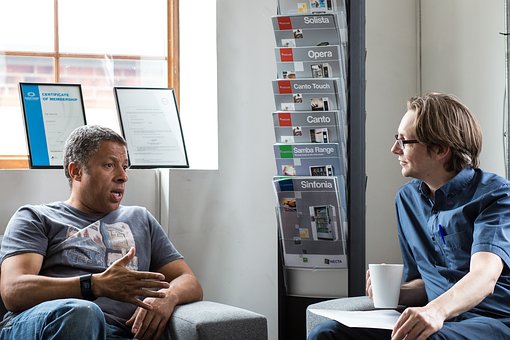Having difficult conversations with colleagues is an essential part of the job for many professionals working in schools. Yet when I think back to the early days of my own career as a relatively inexperienced middle leader, very often I would either delay having them or avoid them altogether.
Why? The clue is in the name: they really are difficult! I would much rather drop hints or make a jokey comment in the hope that this would do the trick. Sometimes of course this would work. But often it wouldn’t. For whatever the reason, the person just wouldn’t pick up on the nudge I was trying to give them. I would worry about being overly direct and how colleagues might react; the temptation to just try another nudge was irresistible.
I learnt the hard way that there wasn’t much to be gained by hiding behind something or someone when delivering a difficult message, and that there is little point in trying to help someone solve a problem until they have truly accepted that something needs to change. But this learning took a lot of trial and error and it was a long time before I was anywhere near confident in what I was doing. Reading Susan Scott’s seminal work, Fierce Conversations, was a source of lots of ideas and practical suggestions, but it didn’t always resonate with my school context.
Over time, however, I began to learn the power of more direct conversation. The one where you give someone the benefit of some authentic feedback that is solely intended to help them to be more effective at what they do. But it took me a long time to work out how best to manage these conversations.
What is the definition of a ‘successful difficult conversation’? Quite simply, it is a difficult conversation that creates positive change, quickly and kindly. Difficult conversation topics that I’ve encountered the most are:
- Not marking books frequently or well enough
- Poor teaching and/or poor planning
- Not working as a team
- Bullying behaviour
- Teaching assistant not working with a child/class well enough
- Year/subject leaders not driving performance across their year/subject
- Missing deadlines/not carrying out agreed actions
- Brusque receptionist
- Lateness
- Laziness
The list is not exhaustive, and there are many more difficult conversation topics that can arise.
Think about how many times a day you need to have a difficult conversation with a member of staff or with a parent. And that’s just your professional life! However, without conflict we cannot be as good, or great, as our potential. And when it comes to our school and the outcomes for our children, we all aspire to be as great as possible.
Whether you’re a master of conflict or not, we are all exposed to conflict every day in our roles; some are big, some are small, some are petty and some are serious. The success of how we deal with this contributes to making a great school with an outstanding culture.

I now know and see a difficult conversation not as something to be afraid of, but something to help bring about change for the better. I fully acknowledge that while these conversations are hard, there are three core components necessary for success:
1. Structure – make sure that your message is heard
When someone doesn’t hear your message, it is usually because it was unclear.
2. Emotional management – stops the conversation being exhausting
Emotions are exhausting for all of us and can often derail a successful difficult conversation. They are, however, a crucial part of these conversations, so learning to manage your own and other people’s emotions is vital.
3. Trust – increases the likelihood of positive action
When the other person doesn’t take action from the conversation, whether all the right things were said or not, is usually due to a lack of trust. I am here referring to trust in the interaction itself, not trust that you may have built up from knowing someone over time. It’s easy to sabotage trust through our non-verbal communication, which in turn reduces the effectiveness of a difficult conversation.
Following a difficult conversation, ask yourself:
- Did it create positive change?
- Did it create this change quickly?
- Was the conversation kind?
Difficult conversations are feedback conversations. Feedback sits at the core of all difficult conversations and feedback is a wonderful thing. It helps us see how we can improve and is the essence of high performance. I embrace the belief: There’s no failure, only feedback. However, many people see feedback as criticism, as pointing out weaknesses and flaws, not as a gift to help them improve and that’s why difficult conversations are so challenging. Granted, not everyone gives feedback well and the person on the receiving end can feel attacked and become defensive. However, difficult conversations should be about giving useful feedback regarding problematic performance or behaviour to help someone else. They should never be an attack on someone’s character.
Elite performers understand the importance of feedback. Truly high-performing teams and organisations place a premium on the value of feedback and deliberately foster cultures that allow feedback to take place constructively, honestly and openly.

After talking with one of my daughters, who recently joined the aviation industry, I learnt that a great example of this culture in action is the aviation industry. The safety achievements of the aviation industry are legendary. Flying is statistically safer than any other form of transport, by a number of measures. This has not happened by accident; the industry has worked tirelessly to achieve, maintain and improve its safety record. Many people believe this safety record is largely down to engineering developments such as autopilots, radar or better engines (which do play a large part). What is less widely known, outside of the industry, is that one of the biggest advances in aviation safety came about through changing the culture of the entire industry via the introduction of what is most widely known as ‘crew resource management’ (CRM) training. CRM can be defined as a system which utilises resources to promote safety within the workplace by improving situational awareness, communication and teamwork. CRM was introduced in the late 1970s, following analysis of several aviation disasters where the cockpit voice recorders (which record all communication in the cockpit during a flight) revealed that unclear communication in the cockpit and poor receptiveness to feedback and challenge was, in many instances, the principal reason for a tragedy.
Successful difficult conversations are an important leadership skill. They affect the impact your team can have and how great they can make the education you are providing to your students. These issues are a barrier to school improvement and if you want your school to be great, or outstanding, you must learn to improve these issues around performance and conduct, quickly and kindly. There’s no one thing that makes a school great. There are many ingredients to it: a powerful vision, strategic decision-making, focusing on the right things at the right time, and many more. Successful difficult conversations are one of these ingredients. They are a hallmark of high-performing teams; teams who understand there is no failure, only feedback; teams who want to do what they do, better than they were doing before.
This is an improving school, a school with healthy conflict; a school with a culture of feedback and success.
